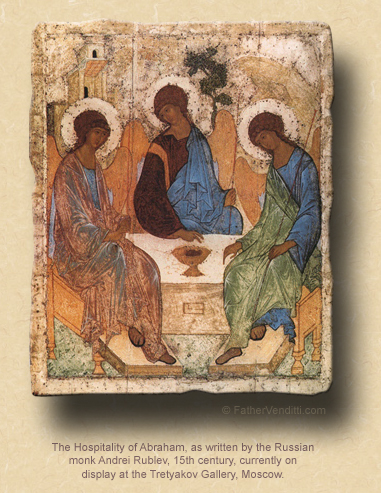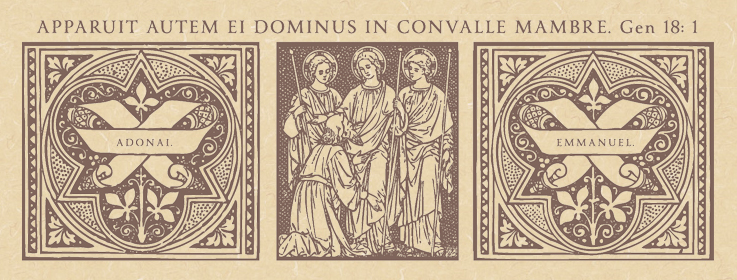Seeing Three, He Adored One.
The Sixteenth Sunday of Ordinary Time.
Lessons from the tertiary dominica, according to the ordinary form of the Roman Rite:
• Genesis 18: 1-10.
• Psalm 15: 2-5.
• Colossians 1: 24-28.
• Luke 10: 38-42.
The Sixth Sunday after Pentecost.
Lessons from the dominica, according to the extraordinary form of the Roman Rite:
• Romans 6: 3-11.
• Psalm 89: 13, 1.
• Mark 8: 1-9.
FatherVenditti.com
|
 8:09 PM 7/20/2019 — I wish to begin today by focusing on our first Scripture lesson from the Book of Genesis, as esoteric as it sounds. It describes our Father in Faith, Abraham, receiving a visit from three young men, and offering to them the hospitality of his home. I know you don't have your Bibles in front of you, but I'm going to try and explain why this story from the Old Testament is so very important. 8:09 PM 7/20/2019 — I wish to begin today by focusing on our first Scripture lesson from the Book of Genesis, as esoteric as it sounds. It describes our Father in Faith, Abraham, receiving a visit from three young men, and offering to them the hospitality of his home. I know you don't have your Bibles in front of you, but I'm going to try and explain why this story from the Old Testament is so very important.
The story is a famous one: Abraham is minding his own business, sowing patches into his tent or something like that, when he's approached by three young men; and yet, the account begins with the line, “He had a vision of the Lord….” How do these three young men constitute a vision of the Lord? In the course of their conversation, Abraham, himself, can't seem to decide if he's addressing three people or just one; sometimes he speaks to them in the plural, and sometimes in the singular. As the passage goes on, it is revealed to us that these three young men are actually angels; but, throughout the Holy Scriptures, angels, when sent by God to deliver a message, often did not speak with their own voices, but with God's. When the angel Gabriel visited the prophet Zachariah to announce that his wife, Elizabeth, would conceive a son who would become John the Baptist, he spoke with his own voice, and even said, “My name is Gabriel, and my place is in God’s presence; I have been sent to speak with thee, and to bring thee this good news” (Luke 1: 19 Knox). When the angel of the Lord appeared to the prophet Elijah, he spoke with God's voice, and spoke directly to the prophet as God, almost like hearing someone's voice through a loud speaker; what you see is the speaker, but what you hear is the voice of one you cannot see.
In this case, the message God wants to send to Abraham, next to the Annunciation made to our Blessed Mother, may be the most important message sent from Heaven to Earth: God wants to tell Abraham about the birth of his son, Isaac, and how Abraham, himself, will become the father of God's Holy People, beginning a lineage which would continue for generations, right through to the birth of Christ, Himself; and, for this message, God figures that just one angel isn't enough. He sends three, because He wants to speak to Abraham with His whole voice, or, if you prefer, with all three of His voices: the voice of the Father, the voice of the Son, and the voice of the Spirit who proceeds from them both.
Many traditional Roman Catholic churches have images of the Blessed Trinity in them, usually in some sort of magnificent stained glass window, or carved in relief over a door, or perhaps painted on the ceiling of the sanctuary, and most of them are fairly similar: they depict God the Father as an old man with a full and flowing white beard seated on His thrown in heaven; they depict God the Son as, of course, our Blessed Lord, usually seated next to Him; the Holy Spirit is typically displayed the way He Manifested Himself at our Lord's baptism in the Jordan: as a dove. Eastern Christian churches, both Catholic and Orthodox, also have images of the Trinity in them, but they are very different: it usually takes the form of a very simple icon showing three angels seated at table, being served a meal by Abraham.  Sometimes it's accompanied by an inscription by Our Holy Father Augustine of Hippo who, in his great treatise on the Blessed Trinity, said of the hospitality of Abraham, “Seeing three, he adored one.” Sometimes it's accompanied by an inscription by Our Holy Father Augustine of Hippo who, in his great treatise on the Blessed Trinity, said of the hospitality of Abraham, “Seeing three, he adored one.”
Trying to consider the Holy Trinity as a theological concept is ill-advised. Saint Augustine, in the Third Century, wrote one of the biggest books he ever wrote on the Blessed Trinity, and all he could say at the end of it was: it's a mystery. Without having the mind of God, there is no way that we can understand how He can be both one and three at the same time: how the Father can be all God, how the Son can be all God, how the Holy Spirit can be all God, and how together they are one God. I think it is more profitable for us not to try and reflect on the Trinity as theological dogma, but rather as a spiritual lesson. We are not God, which means that there are some things in our lives that we simply will never understand. When Abraham conversed with the three young men, he couldn't figure out if he was speaking to one or three, and didn't know until after they were gone that he had been speaking with God. But that didn't stop him from serving Him and giving what he had to give.
Which is the prefect introduction to our beautiful Gospel lesson from Saint Luke. It’s a famous one with which we’re all familiar: “Martha, Martha, you are anxious and worried about many things. There is need only of one thing” (Luke 14: 41-42 RM3).
Like Abraham, we, too, don't often know what God may be trying to tell us through the circumstances of our lives, or even if it is God speaking to us; but that's OK. So long as we continue to serve Him, so long as we remain open to hearing His voice, so long as we remain ever docile and obedient to the movement of Divine Providence, we can be confident that we will always be pleasing to Him.

|

